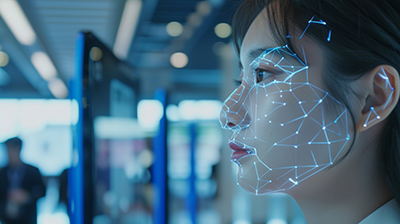A two-headed fight for facial recognition
By Cory Harris, Editor
Updated 9:55 AM CDT, Wed May 1, 2024
The issue of whether to ban facial recognition technology has reared its ugly head again, and this time, the Security Industry Association (SIA) has an ally to help its cause.
SIA joined forces with the International Biometrics + Identity Association (IBIA) – an international trade group that represents the identification technology industry – to compose a letter dated April 15, 2024, encouraging Congress to oppose a provision in the Federal Aviation Administration (FAA) Reauthorization bill prohibiting the Transportation Security Administration’s (TSA’s) use of facial recognition technology at U.S. airports.
 The letter - addressed to Sens. Maria Cantwell (D-Wash.) and Ted Cruz (R-Texas) of the Senate Committee on Commerce Science and Transportation, and Reps. Sam Graves (R-Mo.) and Rick Larsen (D-Wash.) of the House Committee on Transportation and Infrastructure – outlined why TSA should not abandon the use of facial biometrics to verify required traveler documents at security checkpoints.
The letter - addressed to Sens. Maria Cantwell (D-Wash.) and Ted Cruz (R-Texas) of the Senate Committee on Commerce Science and Transportation, and Reps. Sam Graves (R-Mo.) and Rick Larsen (D-Wash.) of the House Committee on Transportation and Infrastructure – outlined why TSA should not abandon the use of facial biometrics to verify required traveler documents at security checkpoints.
Among the reasons that SIA CEO Don Erickson and IBIA Managing Director Robert Tappan cited in their letter to Congress were that the bill’s amendment is based on“ill-informed and spurious claims regarding TSA’s current use of biometric technology and implies a potential for misuse - claims that are completely and demonstrably false.”
“There is zero evidence for claims it is or could be used for mass surveillance,” the letter stated. “Before the technology, TSA personnel visually compared the photo on each ID with the person presenting it to verify that they match. On a completely voluntary basis for travelers, the technology now automates, speeds and more accurately performs this step, which verifies that the person at the kiosk matches the digital photo already stored on their ID or enrolled in a voluntary program. Following this process on site, the information is then overwritten to take on verification of the next passenger in the security queue. No biometric information is retained or shared following this verification process.”
Erickson and Tappan noted that facial biometrics are currently in use for traveler verification at TSA security screening checkpoints in more than 80 airports across the country and pointed out the security benefits that facial recognition technology provides for millions of U.S. air travelers.
“The technology provides enhanced security, accuracy, and convenience for travelers, without impacting existing privacy rights or changing privacy expectations,” they said. “This 11th-hour measure will compromise programs that facilitate the safety and enhance the travel experience of travelers across the nation.”
SIA has long been an advocate for the benefits that facial recognition technology offers the public and private sector. As outlined on SIA’s website, the association “believes all technology products, including facial recognition, must only be used for purposes that are lawful, ethical, and nondiscriminatory. Facial recognition technology makes our country safer and brings value to our everyday lives when used effectively and responsibly.”
IBIA has also strongly advocated for the use of biometric technology. In 2019, the association published a guide to the ethical use of biometric technology titled “Principles for Biometric Data Security and Privacy,” offering guidelines to biometric technology developers and users that would “help build public trust.”
As Erickson and Tappan noted in their letter to Congress, the U.S. Department of Homeland Security and agencies such as TSA have already adopted an extensive facial recognition technology governance policy that includes comprehensive oversight responsibilities, data privacy and civil liberties obligations, and testing and evaluation requirements.
In addition, the two entities noted that more than $150 million in taxpayer dollars invested thus far in TSA’s development and integration of facial biometrics into its equipment, contracts, and programs - including security kiosks - would be “upended” if the measure were to pass.
“The specific, limited, and beneficial role of facial biometrics in air traveler security must be thoroughly examined before extreme measures like banning the technology are considered,” Erickson and Tappan said. “An outright ban on this technology would eliminate important security and privacy protections already thoughtfully put in place.”
Kudos to Mr. Erickson and Mr. Tappan for their efforts in ensuring that facial recognition technology at arguably the most highly secure facilities in the U.S. – our airports – is not taken away. Congress, do the right thing!
Comments